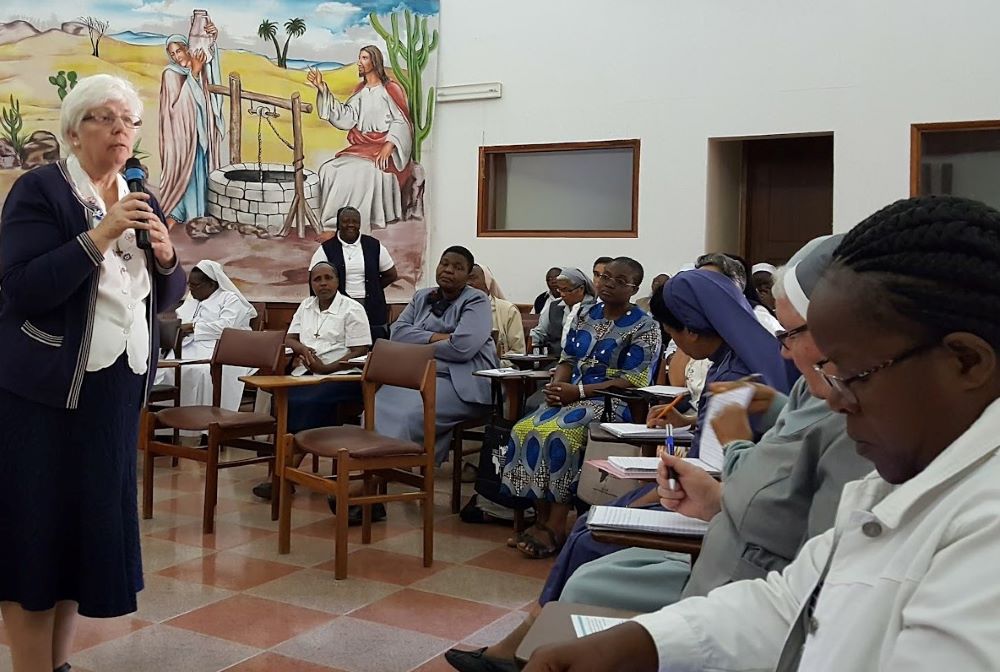
Pat Murray gives workshop in Nairobi, 2016: Loreto Sr. Patricia Murray gives a workshop presentation in Nairobi in October 2016. Murray is a longtime champion of the global sisterhood and elevating the ministries and work of sisters. (GSR photo/Gail DeGeorge)
As the weeklong plenary of the International Union of Superiors General drew to a close, Sr. Patricia Murray, the body's executive secretary since 2014, stood and acknowledged a moment of vigorous applause from hundreds of sisters. But she quickly took to a side table, where she sat alone and quietly wrote thank-you notes to attendees and staff members.
Asked recently about that small gesture and her somewhat low-key presence during the May 2-6 event in Rome, Murray said it is the elected UISG officials — like the president and vice president — who take the stage.
"As the executive secretary and the staff, we're there to support them in every way. And we have wonderfully gifted staff members," she said during a recent Zoom call at the end of a 10-hour day. "You create space for people to use their gifts. And we do it as a team. I think it's an opportunity for the giftedness of people to contribute to the whole, and it makes events richer.
"In a sense, somebody needs to be the conductor, allowing the orchestra to play all those different instruments," she said of leading the global network of almost 2,000 congregational leaders.
The music analogy is apt for this Loreto sister who grew up in Dublin and who speaks of her love of Irish poetry, storytelling and ritual as a way to affirm hope in the face of life's rough edges and vicissitudes — a characteristic undergirding Murray's 50-plus-year ministry.
That ministry was honored Aug. 12, when Murray received the 2022 Outstanding Leadership Award from the U.S-based Leadership Conference of Women Religious.
It doesn't take long for Murray to speak of hope in challenging situations. She acknowledges that she and UISG members have been seriously tested in recent years, both with undertaking new initiatives and the challenge of facing a global pandemic in which hundreds, perhaps thousands, of sisters died, some of them colleagues, associates and friends.
"You carry that pain inside. You carry whether it's the trafficked women, the exploited, the people suffering from COVID, Black Lives Matter," said Murray, a member of the Institute of the Blessed Virgin Mary. "You carry the struggle of humanity inside when you contemplate the world, and yet, you carry the hope of the transformation of lives."
Sr. Jolanta Kafka, the superior of the Claretian Missionary Sisters who served as president of UISG from 2019 to the end of her term in May, said Murray's commitment to such transformation is unshakeable.
"I have always appreciated her, first of all as a woman of faith and prayer, and with great love for female religious life," Kafka said in an email to Global Sisters Report. Murray, she said, has a special concern "for those who are fragile and more in need of accompaniment and assistance."
At UISG, Kafka said, Murray is "a woman of deep love for the church without falling into an uncritical position" and is deeply committed to working "for a global culture of care, for an evangelical exercise of leadership and the theological grounding of young generations of woman religious."
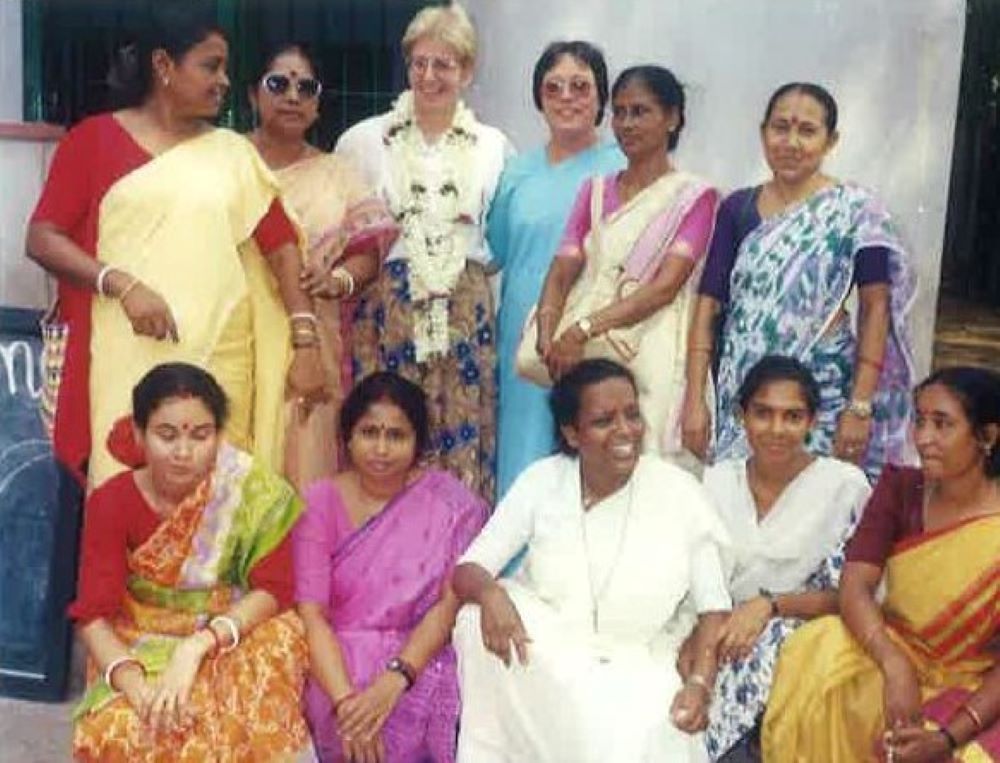
Loreto Sr. Patricia Murray, top row center, with Loreto novices in Kolkata, India, in the late 1990s (Courtesy of Patricia Murray)
Murray demurred when asked about her reaction to the LCWR award, saying the honor recognizes not just her, but UISG and sisters globally.
"I'm grateful to God that we are a global sisterhood. I really am so grateful that we feel more connected than ever and know that where one of us is, all of us are, and that we try to support one another how we can and as we can." She paused. "When you share honestly and acknowledge vulnerability and struggle, then it doesn't matter where you're from in the world."
Murray turned 75 in July, and despite experiencing a mild case of COVID-19 earlier this year says she is blessed to feel vigorous and hearty. "When people learn my age, they say to me, 'You're not.' I say, 'Well, actually I am.' That's what the numbers tell me. But my heart and mind and soul will tell me something else. I say to the Lord, 'Give me the energy to do what you're asking me to do and let me do what I can do with the energy I have.' "
Even so, Murray talks a lot these days, both publicly and privately, about vulnerability and her belief that the Catholic Church needs to embrace its own vulnerabilities as an institution as it tries to become more of a synodal church that prizes listening, embraces diversity and welcomes those on the margins.
'What I love about sisters is we just see what's to be done and begin to get on with it.'
—Loreto Sr. Patricia Murray
"We're all on this pathway together. We have different roads and responsibilities both as individuals, but also as members of a parish or a religious order or a diocese," Murray said. "And we're trying to read the needs of today, listen to God's word and really find the most appropriate way to respond. And also, to show the face of a merciful, tender and compassionate God."
Embracing the plenary theme of vulnerability was determined by the realities of the times, particularly the global pandemic.
"Of course, we all feel vulnerable. And I think part of the history of the church is, sometimes, people are put up on pedestals or they're seen to be different to the rest of humanity," Murray said.
"And in reality, we are the same, we're on our own personal life journey or on our group journey, on our community journey, and we face the ups and downs of life. Often, people are dealing with family worries, just like any other person. And those who are leading congregations are dealing with multiple issues and concerns as well as nurturing hope and also reaching out to new missions and ministries."
Church leaders, Murray believes, have to acknowledge that "you don't know it all. You turn to the wise advice of the people around you, and also, you pray to the Holy Spirit that you make good and wise decisions.
"But we don't always get it right."
Blessed by acts of love amid life's struggles
Murray said her own life has been "graced by receiving tenderness, compassion and love" from those who have "blessed me in a very positive way in the struggles of life."
That, she said, "nourishes you and deepens you. And I think when that happens, you are responding from a very different place because you're responding from an interior place, a place of reflection, a place of discernment, a place of prayer."
One of Murray's most searing moments followed a June 1986 fire at Loreto Convent in St. Stephen's Green in Dublin in which six elderly sisters died.
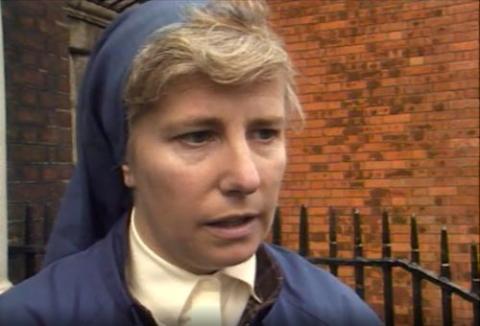
In a video from RTÉ Archives, Loreto Sr. Patricia Murray speaks about the June 1986 fire at Loreto Convent in Dublin that killed six Loreto sisters. (GSR screenshot/RTÉ Archives)
Because she had some media training in working with the Episcopal Justice and Peace Commission in Northern Ireland, Murray was selected to speak on behalf of the congregation.
"On the morning of the fire at 5 o'clock in the morning, I was sent for to come in and be the spokesperson," she said. "I was alone in that task. Everybody was in shock."
The experience of vulnerability, Murray recalled, "came from the fact that I was making sense of really such a painful event, and I was doing it in public. I had no prepared script. The first interview I gave, I just stepped out on the steps."
Yet what Murray said and how she said it touched people. "I got letters from all over the world, and I think it was because I spoke from this place of vulnerability and trying to make meaning and sense of the death of six wonderful women who had great lives of service."
The work in Northern Ireland from 1980-83 also prepared Murray for that moment in Dublin. The Episcopal Justice and Peace Commission was a coalition of Catholics and Protestants committed to peacemaking efforts in Northern Ireland. As a peace education officer, Murray — driving alone from neighboring Ireland and sometimes wearing a veil — would find herself in areas plagued by violence and sectarian animosity.
"You knew by the signage, by the flags, and at times, I was driving where there had been incidents the night before, or somebody had been killed or murdered in a particular area and there was anger," she said. "I think it was only when I looked back later did I realize the sense of vulnerability."
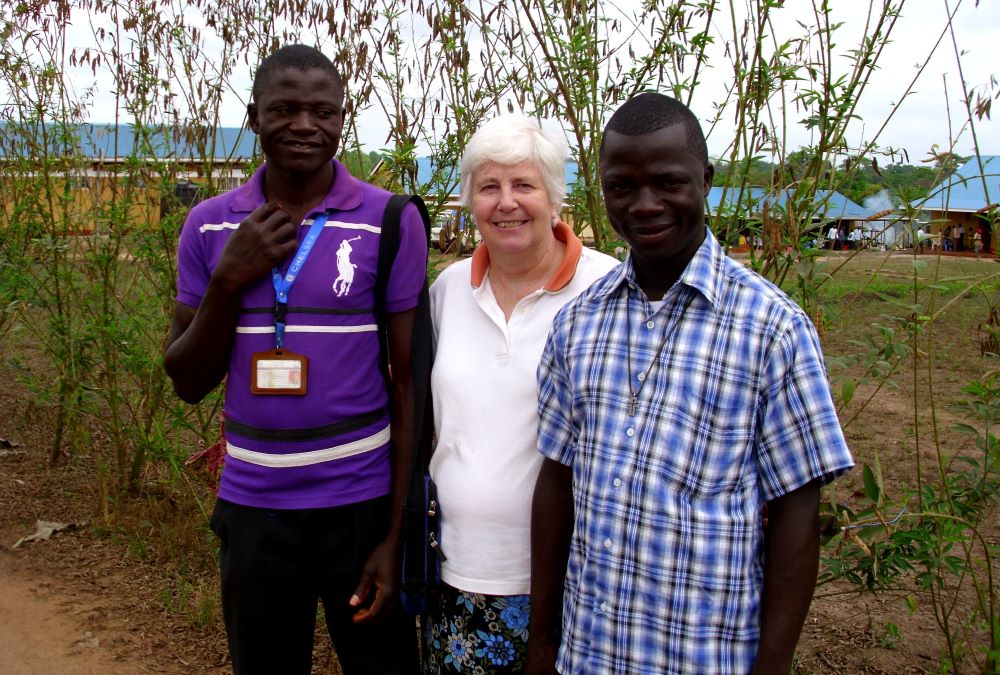
Loreto Sr. Patricia Murray with two staff members of the Solidarity Teacher Training College in Yambio, South Sudan, during a 2013 visit to Solidarity with South Sudan projects. (Courtesy of Friends in Solidarity)
Another defining experience came in 2006, when, as the first director of the cooperative ministry Solidarity with South Sudan, Murray and five others in a global delegation arrived from Kenya and landed at a lonely dirt airstrip in Yei, a city in what was then southwest Sudan.
"The soldiers came out of the bush," she said, "and I remember feeling our vulnerability. We were six who had come from Rome to make this visit. And we knew the instability in the country."
Murray said she came to realize that, if done correctly, an outsider can play a mediating role in places riven by violence and conflict "if the outsider comes with respect and comes to learn and can offer wisdom if the wisdom is asked for. It's not about imposing something, but it's about companioning people who are trying to build a new society in a new way of living."
A look outward and a need to reflect
Murray's own sense of call came relatively early, though in an unexpected way.
She describes her parents as "country people" who migrated to Dublin. There, Murray attended a Catholic primary school run by laypeople. She did not know any Catholic sisters.
That changed during visits to relatives outside Dublin.
When she was 11 or 12, Murray visited a Loreto convent school in Enniscorthy, Ireland, that her cousins attended. She was immediately impressed by the school principal.
"Just who she was had a profound influence on me — how she spoke with my cousins and interacted with them, and just the very quality of her presence," Murray said.
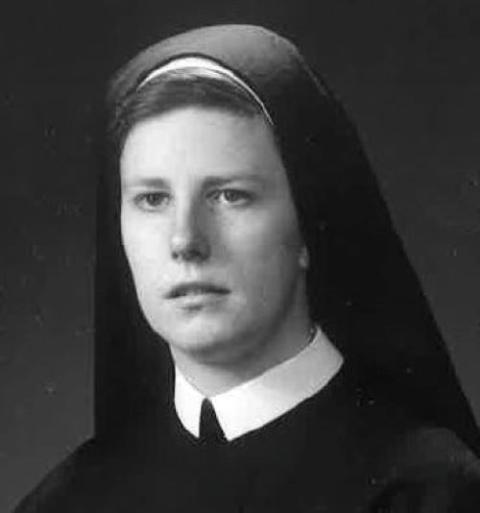
Loreto Sr. Patricia Murray after her final profession of vows in 1976 (Courtesy of Patricia Murray)
Back in Dublin, she persuaded her parents to enroll her in a Loreto high school. "It was a seed that was sown in me at 12 which, in a way, I had to nourish myself by taking steps. Could I go to a school like that school and meet other sisters like her?"
As she continued her education, Murray "more and more felt I was being called to religious life. And I had a very strong sense at 18 that I needed to enter religious life then or I would never do it. So I said, 'Let me try it. And if it's not to be, I can leave.' "
She did not leave, and she recalls early relationships and friendships within the congregation as being especially formative. In one case, Murray befriended a young sister dying of cancer and felt a mystical bond with the woman. "I had a real sense that in some way, I was coming to replace her. I said, 'This isn't just a coincidence. This is because of the goodness of the life of this woman.' "
Stints as a teacher in Ireland followed, as did eventual Master of Arts and Doctor of Ministry degrees from Chicago's Catholic Theological Union.
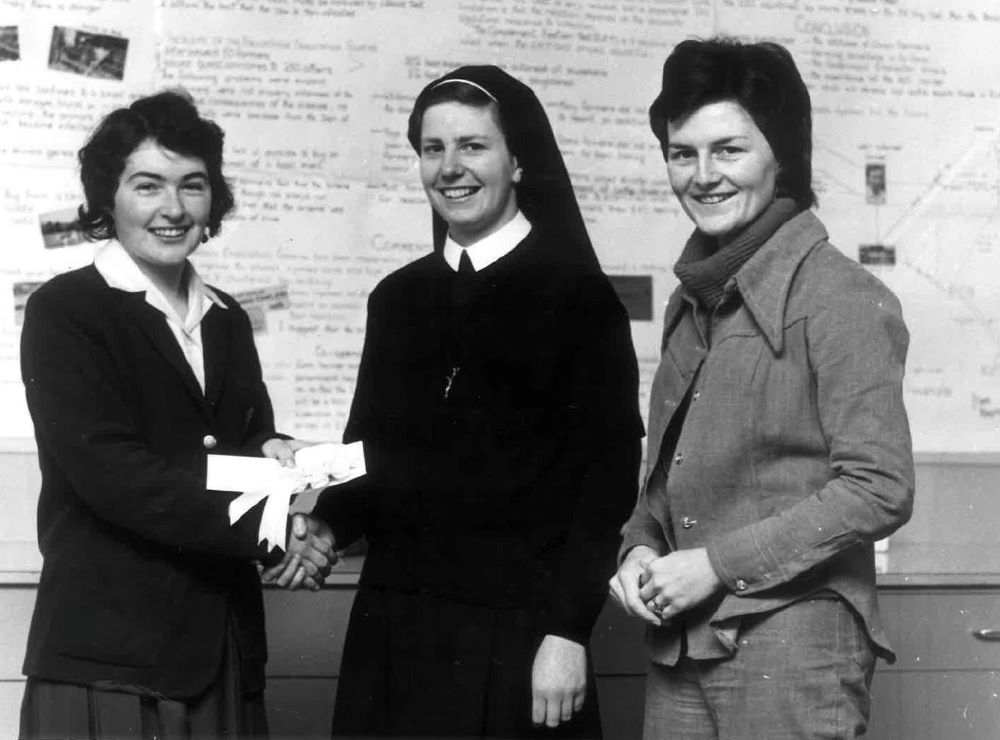
Loreto Sr. Patricia Murray, center, and colleague Phyllis McMonagle, right, congratulate Loreto College Cavan student Helen O'Callaghan for her success in the Irish national Young Scientist Exhibition in this undated photo early in Murray's religious life. (Courtesy of Patricia Murray)
No matter where she has been, Murray has looked outward to the larger world. She credits her congregation's foundress, Mary Ward (1585-1645), for being a lifelong inspiration.
"Mary Ward was an extraordinary woman with the vision for women in the church," Murray said. "She wanted to be out in the middle of life. And, in a sense, I suppose the journey since Vatican II has been that journey to actually live into what was the full charism of Mary Ward."
Another influence is Ignatian spirituality — the Loreto sisters are an Ignatian congregation — which stresses the life journey is taken with God and in finding God "in every situation in life."
"There's something more God calls you to as we move through life. What is it? Where is it? And it's not about doing, it's about being. It's about the quality of one's own being. What one does obviously affects that quality," she said. "If you do things without reflection, you're not going to be changed and transformed, but if the things you engage in cause you to reflect at a deeper level, God is making space in your heart for other things and in life and in your soul."
For Murray, the "other things" in her eight years at UISG have been considerable. These include distributing millions of dollars to assist congregations facing pandemic challenges as well as helping European congregations house refugees from Ukraine. Other efforts: advancing the organization's online presence, which has helped bring congregations closer for regular webinars; supporting ministries for migrants; and expanding advocacy efforts and established ministries like Talitha Kum, UISG's cooperative anti-trafficking ministry.
Such efforts have earned Murray the respect of other sisters concerned about issues rooted in social justice.
"She is a woman of vision," said Sr. Winifred Doherty, a fellow Irish sister who represents the Congregation of Our Lady of Charity of the Good Shepherd at the United Nations in New York. "She has done tremendous work, and the care and empowerment of people at the grass roots has always been her bottom line."
Advertisement
As her long day rolled into its 11th hour, Murray betrayed no sense of being tired, speaking enthusiastically about the "prophetic role religious women play in the world — in calling both ourselves and others to live in a more simple and grounded and respectful way, respectful of people and respectful of the planet, and finding new ways of tackling war and hatred and violence and destruction and oppression."
Murray is proud of her fellow sisters and the "generosity and goodness of women today to give their lives, to offer their lives in a sense, for the rest of their lives."
But that is no reason to feel content or satisfied.
"There's a lot to do," Murray said, "and what I love about sisters is we just see what's to be done and begin to get on with it."





